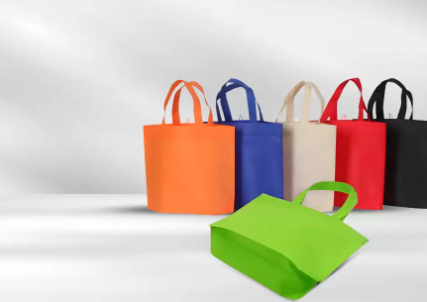
In recent years, the growing concern about plastic waste has driven individuals and businesses to seek sustainable alternatives. Among the many eco-friendly solutions available today, non-woven bags have emerged as a practical and effective way to reduce plastic waste. These reusable, durable, and environmentally friendly bags are making a significant impact on our efforts to combat pollution and create a greener future.
What Are Non-Woven Bags?
Non-woven bags are eco-friendly alternatives to traditional plastic bags. Unlike woven fabrics, which are made by interlacing threads, non-woven materials are bonded together using heat, chemicals, or mechanical processes. These bags are typically made from polypropylene, a recyclable material, making them durable and sustainable.
Key features of non-woven bags include:
- Lightweight yet strong construction.
- Reusability that outlasts plastic bags.
- Customisable designs for personal and commercial use.
Non-woven bags are widely used in shopping, packaging, and promotional events due to their versatility and environmentally friendly nature.
The Environmental Impact of Plastic Waste
Plastic pollution has become one of the most pressing environmental challenges of our time. Every year, millions of tons of plastic waste end up in landfills, oceans, and other natural habitats, harming wildlife and disrupting ecosystems.
Here are some alarming statistics:
- Over 300 million tons of plastic are produced annually, with a significant portion being single-use plastics.
- Only 9% of all plastic waste ever produced has been recycled, while the rest is discarded or incinerated.
- Plastic bags can take up to 500 years to decompose, releasing toxic chemicals into the soil and water.
- The harmful effects of plastic waste underscore the urgent need for alternatives like non-woven bags, which offer a sustainable solution to this global crisis.
How Non-Woven Bags Help Reduce Plastic Waste
1. Reusability and Durability
One of the primary reasons non-woven bags are effective in reducing plastic waste is their reusability. Unlike single-use plastic bags, which are discarded after one use, non-woven bags can be reused multiple times. Their durability allows them to carry heavier loads without tearing, making them a reliable option for shopping, storage, and transportation.
By reusing non-woven bags, individuals can significantly reduce their consumption of disposable plastic bags, minimising the amount of plastic waste generated.
2. Biodegradability and Recycling Potential
Non-woven bags are made from polypropylene, which is a recyclable material. While they are not fully biodegradable, they are still far more environmentally friendly than plastic bags. Non-woven bags can be recycled into new products, reducing the need for virgin plastic production and lowering overall waste levels.
Additionally, many manufacturers are now producing biodegradable, non-woven bags, further enhancing their environmental benefits.
3. Encouraging Sustainable Habits
Switching to non-woven bags helps promote eco-conscious behaviour. When consumers and businesses choose non-woven bags over plastic, they actively contribute to reducing plastic pollution. This shift in habits encourages others to adopt sustainable practices, creating a ripple effect that benefits the environment.
By incorporating non-woven bags into everyday life, we can collectively reduce our dependency on single-use plastics and move towards a more sustainable future.
The Benefits of Using Non-Woven Bags
Non-woven bags offer several advantages beyond their ability to reduce plastic waste:
Eco-Friendly Alternative
Non-woven bags are designed to minimise environmental impact. They are reusable, recyclable, and a step toward reducing the use of harmful plastics.
Cost-Effective
Although non-woven bags may have a higher upfront cost compared to plastic bags, their durability and reusability make them a cost-effective choice in the long run.
Lightweight and Durable
Non-woven bags are lightweight yet strong enough to carry heavy items, making them ideal for shopping, grocery shopping, and packaging.
Customisable Designs
These bags can be customised with logos, colours, and designs, making them a popular choice for businesses that want to promote their brand while supporting sustainability.
Wide Range of Applications
Non-woven bags are versatile and can be used for shopping, carrying books, packaging, and even as promotional giveaways. Their adaptability makes them a valuable alternative to plastic bags in various industries.
Industries and Applications of Non-Woven Bags
Non-woven bags are widely used across various industries due to their practicality and eco-friendliness.
- Retail and Shopping: Non-woven bags are popular among retailers for packaging and promoting their products.
- Food and Beverage: These bags are used for carrying groceries and food items, replacing plastic bags in supermarkets.
- Corporate and Events: Companies often use non-woven bags as promotional items with customised logos and designs.
- Healthcare: Non-woven fabrics are also used in medical applications like disposable masks and gowns, showcasing their versatility.
The widespread adoption of non-woven bags across industries demonstrates their potential to replace plastic bags and reduce waste.
How You Can Make the Switch to Non-Woven Bags
Transitioning to non-woven bags is simple and rewarding. Here are some tips to make the switch:
- Buy in Bulk: Purchase non-woven bags in bulk for daily use at home, work, or while shopping.
- Keep Them Handy: Store reusable bags in your car, handbag, or backpack to ensure you always have one when needed.
- Choose High-Quality Bags: Invest in durable and well-made non-woven bags to maximise their lifespan.
- Encourage Others: Share the benefits of non-woven bags with friends, family, and colleagues to inspire them to switch.
.
By adopting these habits, you can contribute to reducing plastic waste and promoting sustainable living.
Conclusion
Plastic waste is a growing environmental concern that requires immediate action. Non-woven bags offer a practical and eco-friendly solution to this problem. Their reusability, durability, and recyclability make them a superior alternative to single-use plastic bags.
By choosing non-woven bags from Universal Bags, we can reduce our reliance on plastic, minimise waste, and protect the planet for future generations. It’s time to make the switch and embrace sustainable living—one bag at a time.













